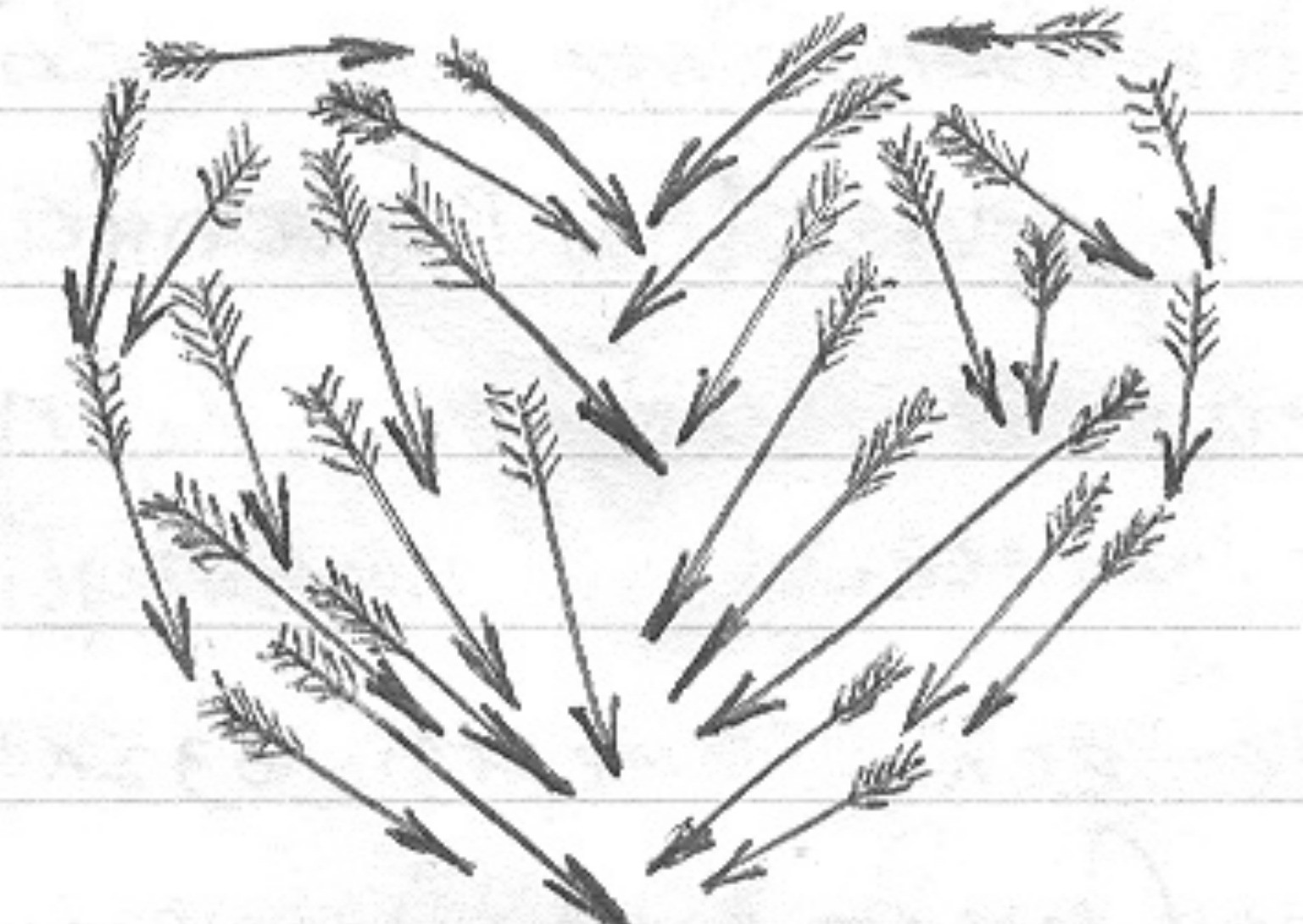
Internet dating is both real and unreal. I project myself onto every surface, every picture, and every face — they might as well be a sex doll or a love robot or a mannequin.
Real Dolls
What do we do when our dolls come to life?
In Mannequin, Andrew McCarthy — an artist turned window dresser — falls for a mannequin played by Kim Cattrall, who comes alive only for him.
In Weird Science, best friends Anthony Michael Hall and Ilan Mitchell-Smith create the superhuman Kelly LeBrock by hacking into a government computer program and attaching electrodes to a Barbie doll. LeBrock is more than a supermodel fantasy, though. Equal parts life coach, anti-bully crusader, sex-positivity advocate, and mom, she functions as a nerd-educator, who teaches the boys how to stand up for themselves and eventually get the girls.
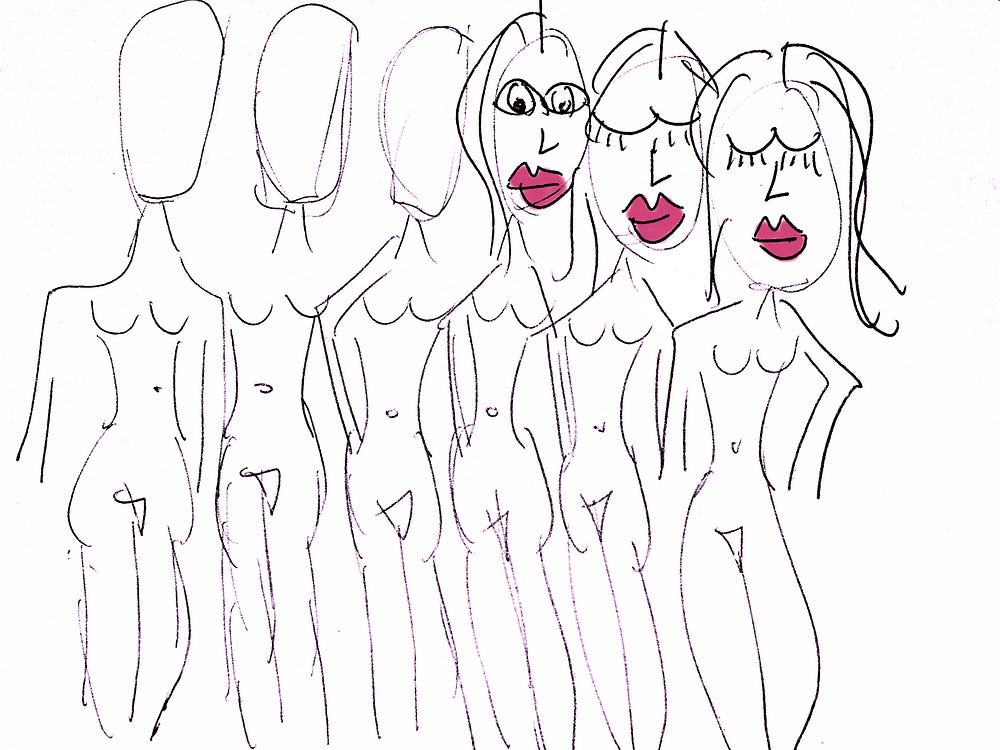
In Lars and the Real Girl, Ryan Gosling decides an anatomically correct “real-girl” doll is his girlfriend.
In Artificial Intelligence, Jude Law plays Gigolo Joe, a lover robot, who knows just what to say and just how to love, even if he is wanted for murder.
In Her, Joaquin Phoenix falls in love with his operating system, Scarlett Johansson. Disembodied, but still sexy, Scarlett quickly surpasses Joaquin’s vanilla need for monogamy and stability, revealing to him that she has 641 other lovers.
What do we do when our fantasies talk back to us?
What do we say?
Lite Porn
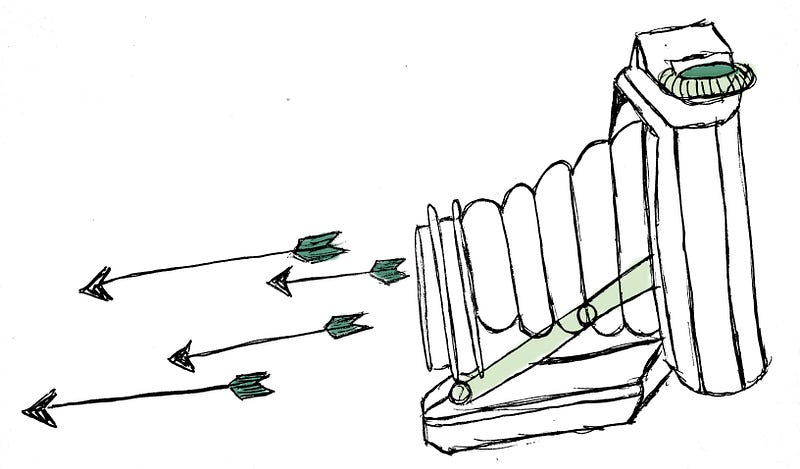
Recently, one of my students wrote an essay on cyberfeminist artists and introduced me to the work of video and performance artist Ann Hirsch, also known as “hornylilfeminist,” who writes: “Whenever you put your body online, in some way you are in conversation with porn.”
I thought about this after I recently re-activated my OkCupid site and added new photos. I remembered a profile I’d seen when I first started Internet dating about two years ago, a guy who answered the standard OkCupid question, “What are you doing with your life?” with the straightforward, “Using this site as my personal spank bank.”
Internet dating is lite porn for the bored and distracted. Granted it’s more face porn than anything else, but one can get off on faces. The picture is a fantasy portal. You may or may not get a real person on the other end of the portal, but for now there’s just the portal. The little round picture at the top of a user’s OkCupid profile where you click, click, click. The square tile of a picture, at the top of your stack on Tinder, where you swipe, swipe, swipe. The mosaic of square pictures that make up the interface of Happn, which lets you know which users you’ve crossed paths with in the last 24 hours.
What do we do when our dolls come to life? When our fantasies talk back to us, what do we say? Click To TweetI sometimes wonder what philosopher and semiotician Roland Barthes would say about the vast field of photographs that populate Internet dating sites. I like to believe he would find them fascinating, not individually perhaps, but collectively. For years, I’ve taught excerpts of Camera Lucida to my students. It gives us a methodology for seeing. Barthes, the master of loving and semiology, understands that primarily, looking is about being bored and feeling wounded: what he names the studium and the punctum.
He describes studium, which is the trickier of the two, as an “application to a thing, taste for someone, a kind of general, enthusiastic commitment, of course, but without special acuity.” I can say that I’m interested in cat photos, in bathroom selfies, and/or in rainy portraits of the Flat Iron building. Studium.
The punctum, according to Barthes:
“ . . . rises from the scene, shoots out of it like an arrow, and pierces me . . . for punctum is also: sting, speck, cut, little hole — and also a cast of the dice. A photograph’s punctum is that accident that pricks me (but also bruises me, is poignant to me).”
What in the photograph wounds you, pricks you, and bruises you? The sting of it. The cut. Chance. Feeling.
Once my students have taken to studium and punctum, it is endlessly fun for me to point at any image and shout, “Punctum?” We know what wounds us, and even if we can’t always articulate it, we can see it in images. But what are the studium of Internet dating photos? Beard shots. Bikinis on beaches. Marathon finishes. A group of friends at a bar. What is the punctum? The close-up of a razor running itself over stubble. The vintage 1970s PBS logo on a T-shirt. A glint in a deep blue eye that seems to be looking right at you. An octopus sleeve tattoo, tentacles stretching down a russet, reddish-brown arm.
The punctum is the portal that allows us to project ourselves onto the image. Does he have a beard I can press my face against? Is he a nerdy bear who loves Studio Ghibli as much as I do? Will she have brunch with me, or will I dart out of her apartment like a fugitive at 4 a.m.?
Like the movies I listed above, Internet dating is both real and unreal, or rather it is the surreal experience of glancing into curated versions of multiple life portals. I project myself onto every surface, every picture, and every face — they might as well be a sex doll or a love robot or a mannequin. To choose — with a click or a swipe — is to decide that this could be a person less of fantasy and more of flesh. I could be with this person — for a drink, for a night, for a short or long while.
I guess that last one is called a relationship, or LTR if I were writing to you on Tinder.
Some Dates
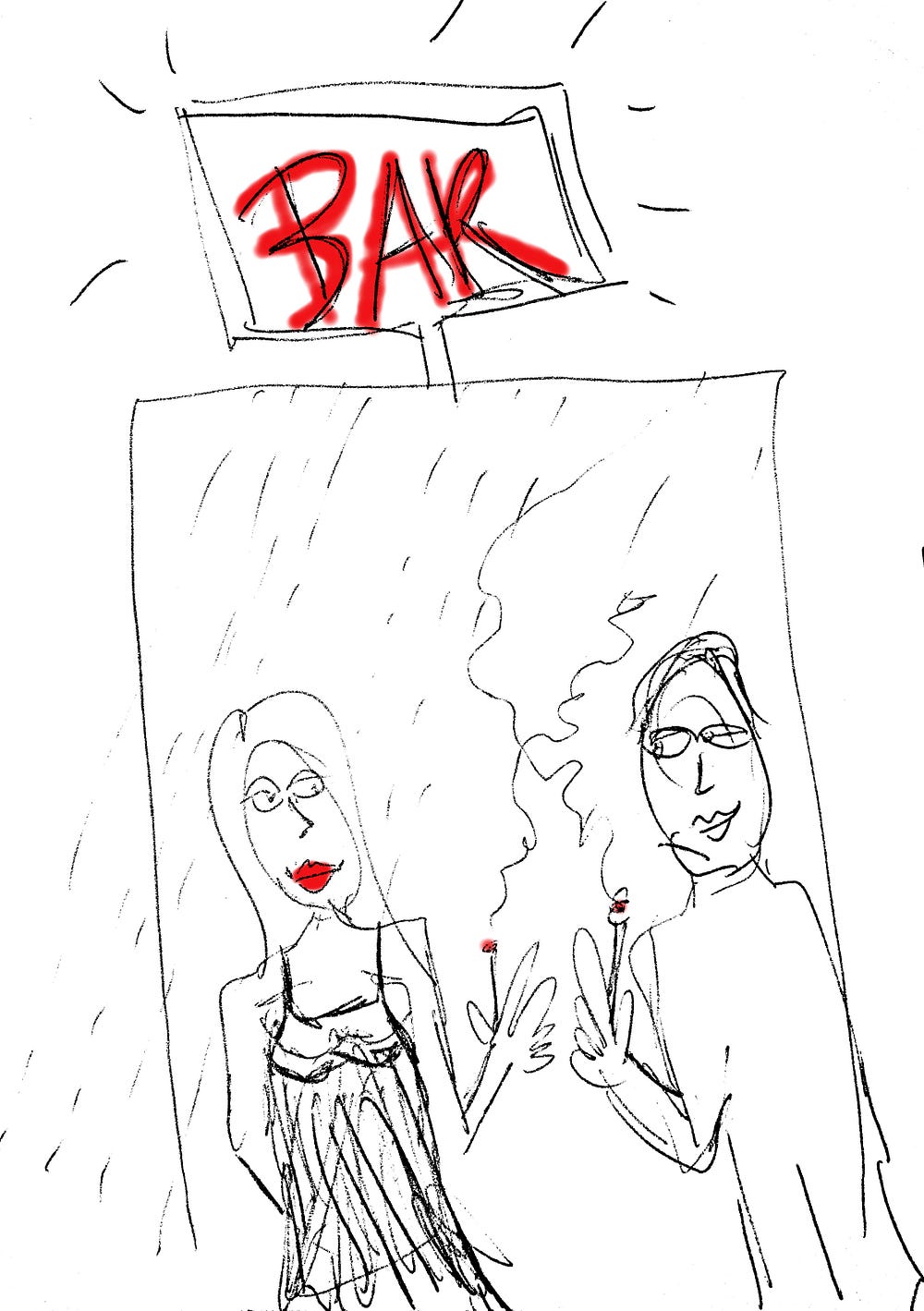
The one I fell in love with, was in a relationship with for almost two years, and is now my dear friend.
The dad who didn’t have enough time.
The one who took me to a speakeasy, asked questions, and listened to the answers.
The one who laughed with delight at my shitty soprano singing voice.
The one who gave me a cigarette and asked if he could kiss me in the rainy doorway outside of the bar.
The one who ordered chicken fingers and mozzarella sticks while I was in the bathroom because “everybody loves them.”
The one who lied about his age, misrepresented himself with old, blurry pictures, made fun of me for not having tenure, and then admitted that he was currently unemployed.
The one who insisted on taking me to an expensive restaurant on the first date, grilled me on my future financial plans during the meal, and wouldn’t let me walk home alone.
The one who ended the date by planting his face on top of mine and exclaiming, “I’m calling it!” as if he were a referee.
The one who was so shy, he couldn’t look at me while we ate chicken and biscuit sandwiches.
The one who was so sick, he couldn’t eat.
The one who got out of rehab four days ago and wanted to see me.
The one who talked with me about Walter Benjamin until we were happily drunk.
The one who had me over for dinner and grilled me two kinds of meats.
The one who was nervous and monologued.
The ones I never met.
The ones I’ve wronged.
The ones I wouldn’t see again.
The ones who disappeared after a message or some texting or a date.
The ones who lost interest.
To choose — with a click or a swipe — is to decide that this could be a person less of fantasy and more of flesh. The ones I scared away.
Interlude
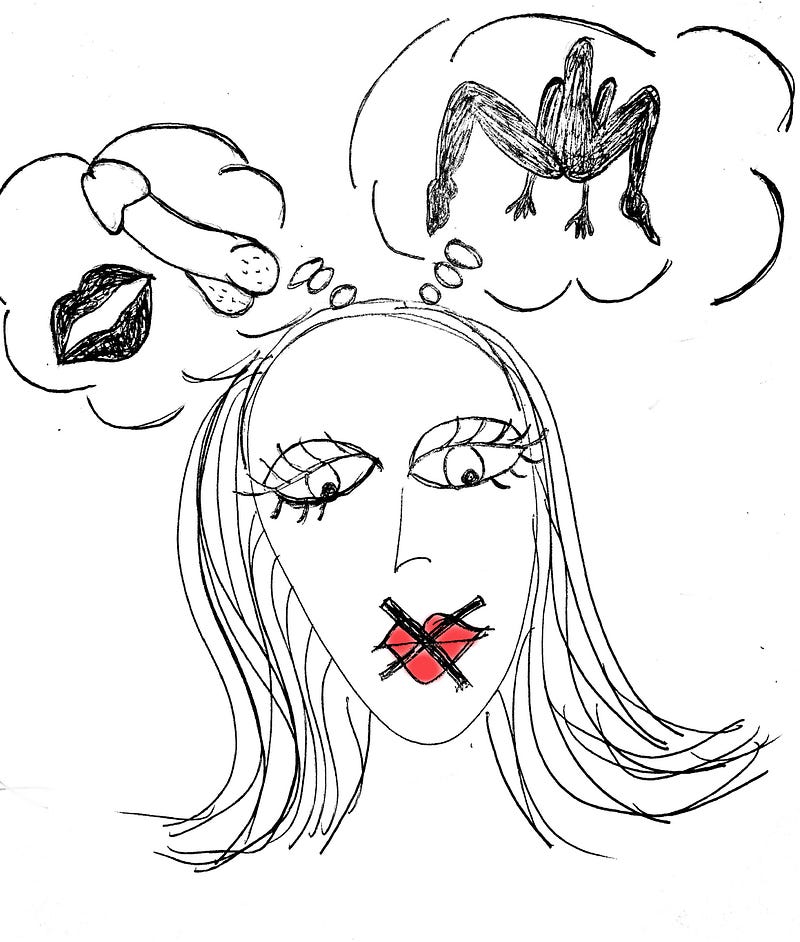
I’ve been working on this essay off and on for about six months. I’ve written another essay about quitting Internet dating all together. I did that for a month and while my life was a little more dull, I was a lot happier. Less distracted. Less rejected. Less guilty for rejecting people. Less pissed off. More focused on what’s good in my life — my kid, my friends, my writing, my students, yoga, movies, books, and readings.
The five or six close friends of mine who are actively Internet dating range in age from 23 to 48. Some are queer, some are straight, and some are not into binaries, but they all express to me in our occasional check-ins about dating a fairly similar sentiment. We are tired. We are bored. We would like people to treat us better — to text back, to communicate even if the information is not in our favor, and to have some actual presence. Mostly, we are talking about men, though I know from stories straight guys have told me that women can be brutal too. Sometimes, though not often, we go on a good date and have a great time. Sometimes that date turns into several dates. Not often, but occasionally.
I have re-written the previous section of this essay several times to better protect the privacy of those dates and because I’m worried that I will be judged about how often I date. I have considered cutting that entire section or not publishing the essay at all. The work (the amount of hours I’ve spent on it!) will not be reflected in what I’m paid for it, and still I’m grateful. I get to work through some hard shit with you as a reader alongside me for the ride. I value your good company. I spend a lot of time by myself, and so I know how much you are worth. You get my vulnerability, my connections, my stories, and my language.
We are tired. We are bored. We would like people to treat us better. Click To TweetRecently, my former student and now badass journalist Jenna Marotta sent me an article called “The Patronizing Questions We Ask Women Who Write,” by Meaghan O’Connell. Jenna had been struggling with whether or not to publish a piece about learning how to talk dirty after a former boyfriend told her that someday her future daughter would read it. O’Connell clarified for me the shame-culture surrounding women, especially moms who write about their sex lives. She writes of the questions mothers get asked and notices that fathers hardly ever do:
“What will your kid think?’ and ‘Are you worried your son is going to hate you when he grows up?’ and “Are you going to let him read it?’ and ‘What’re you going to do when your kid Googles you?’ are all questions that, even when offered lightheartedly and in a spirit of ostensible support, feel less like genuine questions and more like a chastening. ‘Remember, you’re a MOM’ and ‘Remember, you have a mother’ both mean ‘Remember, you’re a woman, and there are consequences.’”
I tell myself and Jenna that I’d rather model sex positivity for my daughter than silence, should she one day come across my essays. I get, as O’Connell does, that she might be teased for it in the future or that this will be the subject of her adult therapy sessions. But yeah, I think all of us who are writing about sex, love, and our bodies understand that there are consequences. We’d just like the conversation to change and for the questions to be about the work and not its effect on those we love. We’re tired of being policed in this way.
I know that every time I publish an essay, I open myself up to judgment. Readers will decide all kinds of things about me that are true and not true.Future dates will read this. Some people will decide I’m a slut and that I’m a bad mom. Others will see that I’m just a woman who loves sex and connection and who believes mightily in the power of bodies to shape knowledge. If you are the latter, I hope you’ll find me on Twitter and/or share your stories too. But if you choose to stay silent, I understand. It’s hard for women to tell the truth about dating, desire, and sex.
We are usually punished for it. Sometimes the punishment is large-scale and public like Bette Midler scolding Kim Kardashian on Twitter for her nude selfie, but more often it’s small-scale and knee-jerk: that tiny unexamined judgment, which disappears as quickly as ash, but leaves a residue.
Portals
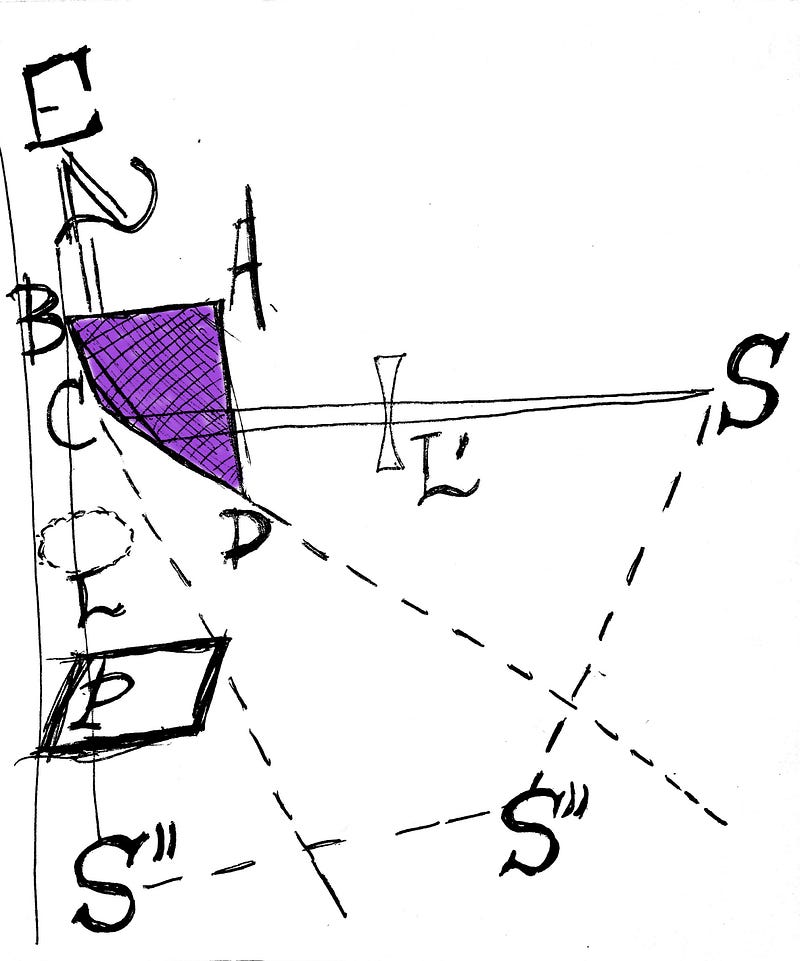
Mostly, in my experience, Internet dating is fielding a lot of unwanted messages; sending a lot of messages that will be ignored; messaging back and forth to see if the person can finish sentences, has a sense of humor, and is not going to be a total dick; and discussing what your schedules are like, and when you may or may not meet up for a drink, coffee, or tea.
I remember when I first started online dating about two and a half years ago, I told a more experienced friend, “I don’t know, it’s just, like, fun to get to meet new people and see what their lives are like.” I don’t remember her response, but I think it was a glassy-eyed stare over my shoulder. I bet she was thinking, “You stupid, stupid, girl,” but she was sweet enough not to say that to me then.
What Internet dating is more than anything else is a time and energy suck. It takes energy to sift through profiles, write and respond to messages, and then go on first dates, which frankly, no matter how amazing, are still just an hour or two with a complete and total stranger. Because I am a mom, with a full-time teaching gig, several second jobs, and a lot of amazing friends, I often don’t want to spend my energy in this way.
I’d rather meet a friend for a drink or go to a yoga class than make small talk with a person I don’t know. But I also still have hope, believe in love and connection, and find relationships appealing, and so I make deals with myself so that I don’t quit all together. I try to go on one date a week, I take dating apps off of my phone so that I don’t check out of boredom or habit, and sometimes I detox and shut down accounts.
Sometimes my married or coupled friends do this cute and exasperating thing of getting excited about my first dates. They say things like, “This could be the one!” or “I have a good feeling!” They seem to get that this is not an appropriate way of thinking about Internet dating or relationships with me (The One? What is that?), but what can they say? What do I say? I’m meeting a stranger for a drink. Chances are we will not hit it off. I hope the person will not be mean or crazy. Because of the low odds of connection here, it’s a good idea to think not at all of the future, to have zero fantasies and very low expectations.
My therapist said recently that I’m tired. He’s right. Maybe I’m a little jaded. Most men and women I talk to about Internet dating are confused by it. We do it because that’s how you meet people. And it works. You do meet people. This essay is not a lament. I am not a Luddite. I have no desire to return to what dating was like in my twenties, when options consisted of picking someone up in a bar (thought this has its occasional charms) and/or letting your friends fix you up.
I am interested in the solitary voyeuristic online things we do that have no discernible outcome or pleasure, but that increasingly orient our lives. What do we do alone, with our Internet portals? We fantasize and project. We inhabit the studium and we look for the punctum. We want to be pierced, wounded, and shot with an arrow. Most of us do anyway, because it makes us feel alive, even if it hurts.
It’s a good idea to think not at all of the future, to have zero fantasies, and very low expectations. Click To TweetI just finished reading July Westhale’s essay, “Loneliness and the Strange Alone-Togetherness of the Internet-Age” about her post-breakup Googling and how it functioned as a curative and a way to grieve. She writes, “the existence of information proves the existence of a thing: a dream, a wound, a love, a memory.” I take this to mean that behind the random information we Google is something more real, something with feeling.
She echoes Barthes here too; behind the image or the information is the wound. Behind the portal is eventually, perhaps, a person, made of flesh and blood, someone who we may or may not want to touch us. It’s the possibility of connection — putting skin next to skin, looking someone in the eye, or the potential for intimacy that keeps us looking.
I wrote this essay to make a record, of sorts, of dating right now in my albeit very limited view. I haven’t come across many essays about the nitty-gritty of Internet dating and none by a single, co-parenting mom in her forties, so I thought I’d write one. I also wrote this essay in solidarity with the other sex-positive women online and in podcasts who have told me about their dating lives. I love both the Huffington Post and New York Magazine sex podcasts. Maureen O’Connor of New York magazine is especially hilarious and smart when it comes to the realities of being single in New York right now.
Behind the Internet portal is eventually, perhaps, a person, made of flesh and blood, someone who we may or may not want to touch us. Click To TweetIncreasingly, after a first date, usually date two or three, when the date knows my full name, they Google me, and find my very personal essays about my abusive father, my attempts at non-monogamy, eating, and my rare neurological disorder. As I wrote this essay, I wondered if this will be the final Google straw that breaks the camel’s back, and scares away all of the dates. I suppose I didn’t care, because I kept writing.
I’m Here for the Time Killing
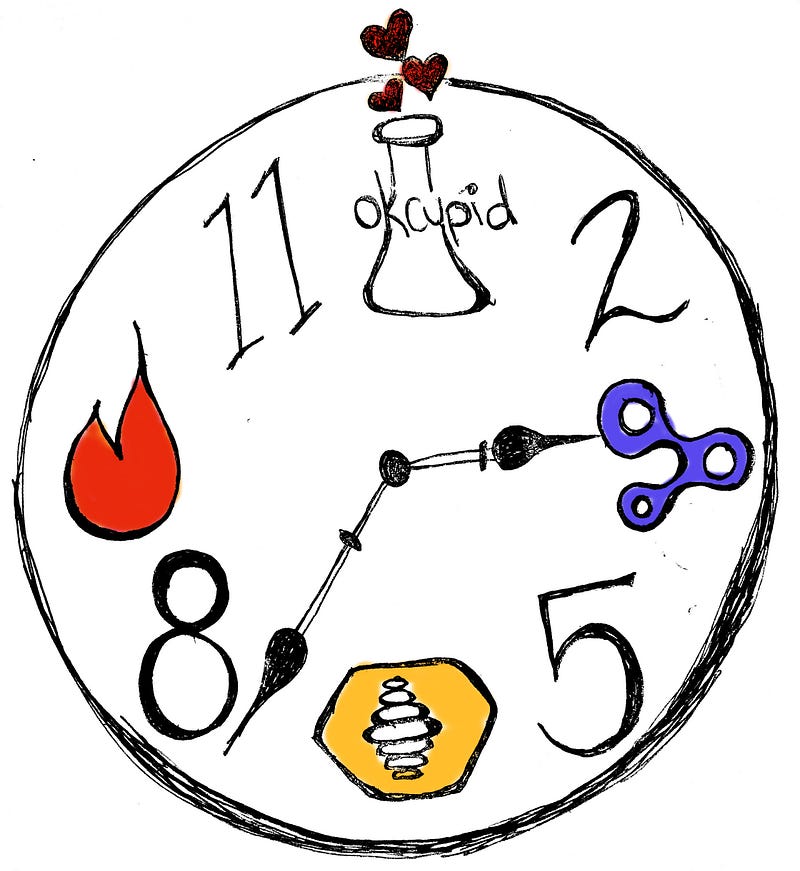
Internet dating is also an exceptionally good way to pass the time. Like all social media, it gives down time — the boredom, fear, loneliness, and distraction of it — a shape. It helps time function and gives it meaning. Not surprisingly, I am more interested in my dating apps when I am parenting because the hour-by-hour minutiae of being a single mom stretches and stops time like nothing else I’ve ever experienced. Are we really watching a fifth episode of Jake and the Never Land Pirates? Why, yes we are! Are we still arguing over whether or not you go to bed at 8:30 or 9:00 at Daddy’s house? Seems like it!
This morning, my daughter woke up at 4 a.m. to barf. I was pleased with myself because I managed to catch the barf in a Tupperware bowl. She fell back asleep and I lay in bed wide awake for an hour or so before I said uncle and curled up in the covers closer to my kid, who still sometimes sleeps with me, and then I scrolled through my OkCupid matches. I had one reasonable message, another that was actually charming, and one from a 28-year-old.
My ex (the one from above that I met on OkCupid and fell into an exciting monogamous and then polyamorous relationship with for two years, before deciding to just be friends) and I often talk about our online dating trends.
It’s become one of our conversational set pieces, because dating is too ridiculous and funny and stupid not to talk about. Or maybe it all just needs to be processed and said out loud or written down. I’ve always been a sharer, a teller, a blurter, and a huge talker. I tell my students and friends that to me there is no such thing as TMI. If I know you, I want to know your shit. Even if I don’t know you, I kind of want to know your shit. I guess that’s why I’ve taken to personal essays. Anything can be evidence, if crafted well.
“I’m trending with 35-year-old working-class dudes who are native New Yorkers and men who have stomach ailments,” I said to my ex at our favorite bar in Brooklyn.
“Ha,” he laughed, and took a sip of the artisanal Old Fashioned that the bartender pretended to make just for us. “Working class like how?”
“Like heating and cooling, like warehouses,” I said.
“Do you guys have stuff to talk about?”
“Music,” I said. “What about you?”
“I’m trending with 50-year-old women from Connecticut who have just come out of a bitter divorce and would like for me to sexually awaken them,” he said.
“You could do that,” I said.
“But then what? What if I want someone to sexually awaken me?”
“You’re already awake,” I said and looked around the bar, which was reliably filled with men and women in their twenties and thirties, us, and the two 40-something year-old brothers who owned it.
“I know!” he said and we returned to our Old Fashioneds.
Round Up
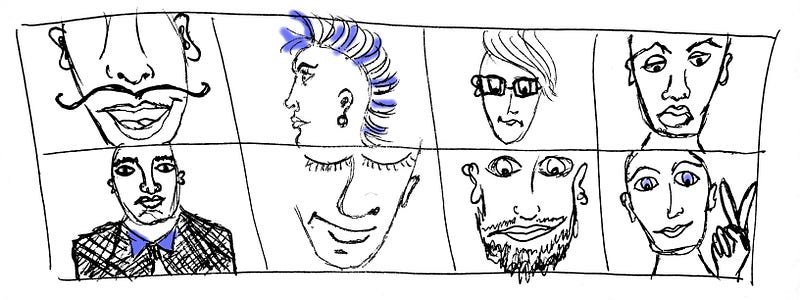
In “The Big Secret of Every Dating App: Tech Doesn’t Matter,” Maureen O’Connor writes:
“But I have come to believe that the technology powering any one dating app doesn’t matter at all. The only thing that matters is its users. In other words: It’s not the technology, it’s the marketing — and what kind of people that marketing attracts.”
O’Connor also reminds us that Internet dating does not mean that the sky is falling or that technology is going to change love and sex forever. It’s just another thing we do to meet people, and we select our dating apps much like we select our favorite bars, cafes, and bookstores.
Are there cute people there? Or is it full of sociopaths who won’t stop staring at our faces? Do people speak to you there, or do they huddle up in a little weird secretive ball and hurl sexist one-liners at you? Is that dance floor truly queer, or does it just claim to be?
O’Connor is right and yet the volume and sheer amount of looking, cruising, staring, and studying we can do has changed. Never before in my life have I had access to so many images of people I may or may not want to date. Volume shifts attention. It can distract us. Studium. Or focus us. Punctum.
If you really want to know how each app functions, read Maureen O’Connor’s essay. She’s less grouchy about dating apps than I am, but here’s my round-up, for what it’s worth:
OkCupid: Like many users, I call this site Okstupid, or Okfineigiveup. It’s like the stadium-size bar of dating apps. It has a lot of users, a lot, like maybe billions? I have met seriously nice, sexy, and smart people on this site who are cool and have jobs and passions and like to ask women questions about their lives and then mostly listen to the answers.
I have also received messages from people who write things like, “I notice your diminutive stature is at odds with your buxom (sic) and substantial bottom.” Hmmm…I haven’t noticed that myself, but thanks. I will try not to trip over my own ass and boobs or let them fling the rest of my body dizzyingly up and down like a teeter-totter. Or “Why haven’t we had sex yet?!” Um, cuz I’ve never seen you before this moment, and your game sucks.
In spite of this, I like the app and have returned to it after taking a break because there are a lot of people on it and so a lot of variety. Also, I read profiles. I like having that much information about someone and seeing whether or not they are funny in print. I don’t like that anyone can message me. I think most of us women have to delete the majority of their messages, but maybe guys do too?
Tinder: An addiction I once had that caught on like wild fire and nearly ruined my life. Ha. No seriously. In case you’ve been dead for the last 18 months, this little app provides you with a pile of cards/profiles that you can swipe left (no!) or right (yes!) to.
If you both swipe right, it’s a match, and you can begin the long protracted messaging stage, which will most likely end in never meeting. It goes through your Facebook page (scary initially, and then not at all) to tell you if you have mutual friends or mutual friends of friends, which is nice because you can ask your friends about someone, although it’s likely they won’t know who the fuck you’re talking about because most of us have too many Facebook friends.
I went on a couple of fun dates because of this app. It’s cool that you can only message with people you’ve chosen, but it’s a horrible time suck because it’s too much like a video game. For the first month I had it, all I wanted to do with every free second was to swipe enough to match with someone, and then keep swiping. The interface is also so addictive that it makes you want to swipe left and right in areas of your life where you can’t. Bad work meeting. Swipe. My cat after he pees outside of the box. Swipe. The K-Mart at Astor Place. You get it.
Happn: I was obsessed with this app for the month I had it. The idea of it is so cool! You can like people based on a little mosaic of profiles that pops up to let you know who you’ve crossed paths with after the fact. I think this is especially exciting for New Yorkers. There are so many of us! How will we find each other? It’s like the Missed Connections ads on Craigslist, except you didn’t miss them and you don’t have to write a creepy ad!
After you like a person, you can also send them a “charm” to let them know, and you can only message with someone if you both liked each other. It’s fun in an anthropological way to know what cute people live near your subway stop or keep going to Gorilla coffee. I wanted this app to work, but I never got from messaging to an actual date with someone. I also had a couple of intense messaging experiences with people who just flat-out disappeared. Not that weird in the world of dating apps, but it seemed more pronounced for me on this site.
Bad work meeting. Swipe. My cat after he pees outside of the box. Swipe. Click To TweetBumble: Supposedly women-friendly. I only tried it for two days, and I don’t remember it well. You both have to match to message each other, but the woman must initiate the contact. There are different rules for same-sex couples. I didn’t stay on the app for long enough to figure out how it would work if I were writing to a girl.
I hated the timer. I’m busy. Fuck off. I don’t have to write to this guy in 24 hours! That’s what my brain said to my phone every time that timer started. Also, I’m not a big fan of passivity in men, so this app was a bit of a trigger for me.
Hinge: On this for about a month. Had one horrible date from it, and then shut it down out of irritation. It only allows you to see people who are in your Facebook network. In theory, this is safer? I found it boring and age-limiting. I love all of my Facebook friends, but I guess I’d rather go further afield for my dates.
Siren: Not really in New York yet. Seattle-based, woman owned and created. I tried it for a day, and couldn’t get the app to function right, so I guess it’s not ready for the full New York launch yet. Looks interesting. I’ll try again maybe. I like the special question every day designed by some culture vulture out there, instead of the endless questions of OkCupid.
I’m curious about, but haven’t yet tried: Score, Once, and HowAboutWe.
Community
On the first day of 2016, I went to the St. Marks Poetry Project New Year’s Day Marathon benefit to read one of my poems to the audience. When I got up to the podium, I looked at my daughter, who promised to give me a thumbs-up when I finished, and then I forced myself to stare out at the 200 or more faces in the audience. I didn’t linger for long enough because I was nervous, but I tried to see them all, to make a study of them, these great people who came to hear poetry on the first day of the new year.
Later as I worked on the ending of this essay, I thought of all of the faces I’ve been able to look at this year, both virtual and real. How lucky you are to have access to so many portals and fantasies, spooling out like a ribbon in the wind, I told myself, but I couldn’t quite make it stick, and so later I wrote it down here in this essay. I wanted to remember this the next time someone I’d been messaging with disappeared with no explanation, or when I went on a shitty first date.
Perhaps I was trying to use these real audience faces — rapt and waiting for me to read to them — to steal myself for the more distant, far away faces in the portals. These faces, both real and imagined, are a gift. I wrote that down too, so that I could carry it around with me, like a Zen koan or an aphorism or a good luck charm.
We all need our puzzles, and this one was mine.

Illustrations by Katie Tandy

